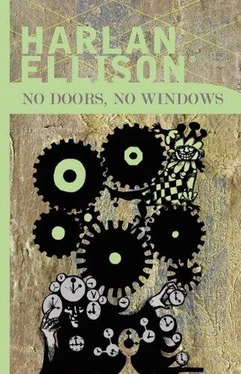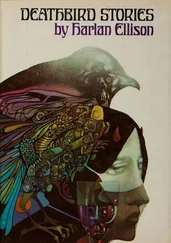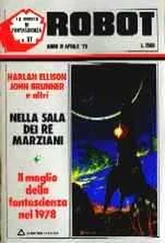“Down in the Dark” [4000] and “The Man on the Juice Wagon” [7500] are action-adventure stories with the emphasis on danger and suspense. They were written for men’s magazines and I found when I re-read them, and wanted to include them, that I had to change the ending to “Juice Wagon” completely to eradicate the stench of male chauvinist rancidness that I, and those magazines, subscribed to in them there unenlightened days. I suppose the men’s magazines still consider women toys to play with, but, like an Alcoholics Anonymous convert, I has seen de light, and I find that treating women as human beings, in my personal life as well as in my stories, makes for a better, richer, more intelligent life … and the same for the stories. Both “Dark” and “Juice Wagon” are based on experiences in my checkered past. To some small degree.
“White Trash Don’t Exist” [6000] has one element stolen from Steinbeck’s OF MICE AND MEN. You’ll spot it right off. That’s okay. It isn’t stealing, it’s, uh, er, research. (What was it Rodin was supposed to have said, quoting Michelangelo? Oh, yeah. “Where I steal an idea, I leave my knife.”) The interesting thing about “White Trash” is that when I first wrote it, for the Manhunt market of the mid-Fifties, a market that used tough, brutal crime stories without even a hint of traditional detective material in it, I called it “Niggers Don’t Exist” and I intended it as a statement about life for blacks in areas of the South I’d passed through. The editor loved the story, but wouldn’t buy it with blacks in it, so I rewrote it using “white trash.” I was hungrier to sell in those days. That was before I got hip to Bob Heinlein’s 5 rules for a writer, and before I added two of my own.
So when you read “White Trash,” you can replace whatever elements this introduction compels you to replace.
What’s that? Oh, I see. I’ve teased you with Heinlein’s and my rules, so the least I can do is digress again and give them to you. I’d be a rat not to do it, wouldn’t I?
Well, never let it be said that a sweetie like me made his readers angry. God knows I’ve never antagonized any of you. Okay, here they are:
1. You must write.
2. You must finish what you write.
3. You must refrain from rewriting except to editorial order.
4. You must put it on the market.
5. You must keep it on the market until sold.
ROBERT A. HEINLEIN, 1947
6. Only accept the last four words of rule 3 if your integrity and the quality / interior logic of the story reconcile with such changes.
Otherwise:
7. Kill to maintain the integrity of your work.
HARLAN ELLISON, 1970
“Promises of Laughter” [3600] happened to me. The lady called “Holdie Karp” is a reasonably well-known author these days. She really did that to me, what happens to the dude in the story. And how I wrote the yarn was this: when the events of that night went down, I got so pissed off I got into my Austin-Healey and drove like a lunatic across the twisting, accident-laden Mulholland Drive to my house, ran at the typewriter like a Rams linebacker, banged out the story (sexual pun intended) in about two hours, yanked the carbon off the desk, got back in the Healey, hit Mulholland again, made the course in about thirteen minutes batting sixty all the way through the night and the fog, slammed into her driveway, and started kicking on her front door.
She came to the window, in her nightgown, obviously having been asleep, saw it was wild-eyed li’l ole me, and damn near didn’t open the door because she was afraid I’d knife her or something. But when she let it slide open just a crack, I shoved the manuscript into her hand, got back in my car and raced away … having had (I thought) the last fucking word, damn her eyes!
It appeared in a magazine containing one of the articles referred to in the story. She was furious. Everyone now knew our personal lives. So several months later she wrote her view of that incident
It was a better story than mine.
We are friends to this day, “Holdie Karp” and I, and she writes for magazines and for one of New York’s biggest newspapers, and she taught me more about being a non-macho male than anyone I’ve ever met.
So the least I could do was to rewrite the story a little, to make it a fairer representation of her, uh, position on that fateful night.
I have no idea why people keep identifying me with the stuff in my stories.
Which brings me to the last story in the book, and the most recent one I’ve written. I wrote it for this book, and unless I sell it to a magazine in the next 5½ months … but we’ve been through that before. Anyhow. “Tired Old Man” [5000] was written in June of this year, 1975. It’s one of my most recent stories, so you can judge how I’m doing these days; but beyond that curious conceit, it is a story with a peculiar history, and one I’m inclined to tell you.
First, however, let me warn you. I am not the protagonist, Billy Landress, even though much of Billy’s career parallels mine and some of the things that happen to him in the story happened in a sorta kinda way, and some of the perceptions at which he arrives are ones I’ve lately come to hold as my own. Now I suppose all that disclaiming will convince those of you who believe in the “he protesteth too much” philosophy that I am Billy. Well, that only goes to show how little some of you understand about the art of creating fiction. A writer takes bits and pieces of himself — as Geoffrey Wolff put it in that quote leading off this introduction — he cannibalizes himself, and he applies a little meat here and a little meat there, and he comes up with a character that bears a resemblance to himself (because who do I know better than myself, for God’s sake), but who is a new person entirely. So don’t get all screwed up trying to fit me into Billy’s shoes.
Back to the story.
I was in New York on a visit about eight, ten, eleven years ago. I went to dinner with Bob Silverberg and Bobbie Silverberg, and after dinner we went to a gathering of the old Hydra Club. Willy Ley was there; it was shortly before that great and wonderful man died; it was good to see him again. And a bunch of other people, most of whom I didn’t know. And I wandered around and finally found myself sitting on the sofa next to a weary-looking old man in an easy chair. Marvelous conversationalist. We talked for almost an hour, until I got up and went to the kitchen where I found Bob with the late Hans Santesson, a dear friend and ex-editor of mine. I described the old man and asked who he was.
“That is Cornell Woolrich,” Hans said.
My mouth must have fallen open. I had been sitting next to one of the giants of mystery fiction, a man whose work I’d read and admired for twenty years, since I’d been a kid and discovered a copy of BLACK ALIBI after seeing the 1946 Val Lewton film, The Leopard Man. I was nine years old at the time, and the film made such an impression on me that I stayed on at the Lake Theater in Painesville, Ohio to see it three times on a Saturday. And it was the first time I ever really read those funny words that come at the beginning of the movie (I later learned those were the “credits”); the words that said “Screenplay by Ardel Wray, based on the novel Black Alibi by Cornell Woolrich.”
How I got hold of the novel, I don’t remember. But it was the first mystery fiction I’d ever read (excluding Poe, of course, all of whom I’d read by that time). Nine years old!
And in the years when I was voraciously devouring the works of every decent writer I could find, Woolrich (under his own name and his possibly even-more-famous pseudonym, “William Irish”) became a treasurehouse of twists and turns in plotting, elegant writing style, misdirection, mood, setting and suspense. God, the beautiful stories that man wrote. The “black book” series: THE BLACK ANGEL, THE BLACK CURTAIN, THE BLACK PATH OF FEAR, RENDEZVOUS IN BLACK, THE BRIDE WORE BLACK and, many more times, BLACK ALIBI. And DEADLINE AT DAWN, PHANTOM LADY, NIGHTMARE, STRANGLER’S SERENADE, WALTZ INTO DARKNESS. And all the short stories!
Читать дальше












